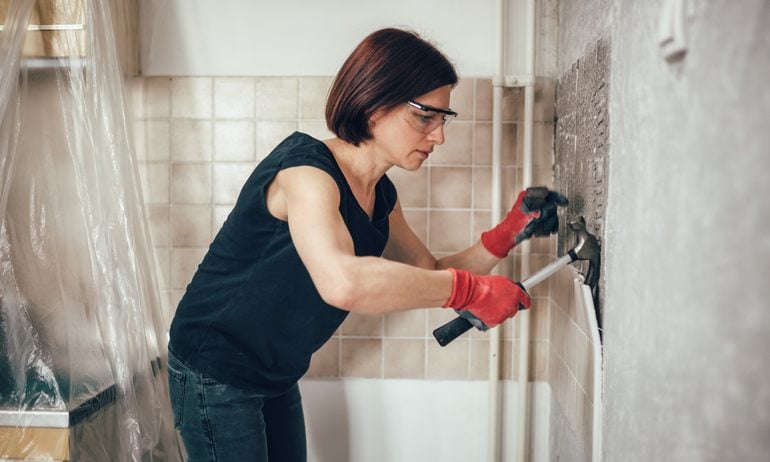How to Budget for a New Home So You Don’t End Up House Poor
Before buying a home, figure out how much house you can truly afford, including ongoing costs and repairs.

Some or all of the mortgage lenders featured on our site are advertising partners of NerdWallet, but this does not influence our evaluations, lender star ratings or the order in which lenders are listed on the page. Our opinions are our own. Here is a list of our partners.
A homeowner who is "house poor" spends too much of their income on paying their mortgage and maintaining their home. Sure, buying a home can be a sound investment, but you don't want it to become a financial burden. If you're considering buying a home, here's what you should know about housing costs in order to avoid becoming house poor.
Treasury Bills or HYSA: Which grows your down payment faster?
With yields that beat most high-yield savings accounts, the Atomic Treasury account can offer a smarter way to save. Plus, earned interest is exempt from state and local taxes.
What does it mean to be house poor?
When someone says they are house poor, it means they spend so much of their income on homeownership costs — such as monthly mortgage payments, property taxes, insurance and maintenance — that there’s very little left for other important expenses.
Being house poor can limit your ability to build up retirement or other savings, pay off debt, travel or enjoy life.
There isn't an official threshold for being house poor, but the Harvard University Joint Center for Housing Studies defines a household as "cost-burdened" if the homeowners must spend 30% or more of their household income on housing and utilities.
The percentage of cost-burdened homeowners decreased throughout the 2010s, but post-pandemic the number has increased sharply. In 2023, the most recent year for which data is available, 24% of U.S. homeowners were cost-burdened, according to the Joint Center. That's more than 20 million households.

How do people become house poor?
People become house poor when their housing costs go beyond what's reasonable for their household income. This might happen because they bought a pricey home, but it can also happen if a once-affordable home becomes too expensive.
Given how high home prices in the United States have become, homes that are within reach of many first-time home buyers' budgets are hard to find. Buyers may find themselves stretching their budgets to buy a home and hoping their future income will catch up.
In other cases, home buyers underestimate the ongoing costs of homeownership — there's a lot more than just your mortgage. While their home loan may be affordable, the costs to maintain the home could be overwhelming.
It's a scary scenario, but even longtime homeowners can find themselves house poor if their housing costs change. With a fixed-rate mortgage, your principal and interest cost don't increase with time. But other major costs, like property taxes and homeowners insurance, can change. Homeowners in areas that have experienced major natural disasters may find their insurance costs skyrocketing.
In 2018, the average annual homeowners insurance premium was $1,081, according to researchers at Freddie Mac. By 2023, that average had grown to $1,522 — a 40.8% increase.
» MORE: Estimate your homeowners insurance costs
How to avoid becoming house poor
Know how much home you can afford
Before shopping for a home, it’s important to figure out how much house you can comfortably afford, which may be a different number from the maximum mortgage you can get approved for. You'll need to examine both how much money you have coming in and how much you have going out, particularly debt payments. An affordability calculator can help you run the numbers.
One commonly cited rule of thumb is that you shouldn’t spend more than 28% of your gross monthly income on housing-related costs and 36% on total debts, including your mortgage, credit cards and other loans.
While the 28/36 rule is a good guideline, says Mark Avallone, a certified financial planner at Potomac Wealth Advisors in Maryland, everyone’s situation is different, and the rule doesn’t take into account the need to leave room in your budget for one-time costs like furniture, as well as maintenance and repairs.
Keep track of homeownership costs
We've already hit on the big-ticket items: Mortgage principal and interest, property taxes and homeowners insurance. But there are other regular costs homeowners face that you'll want to account for, too.
Monthly homeownership costs can also include:
A budgeting app can help you keep tabs on these costs as well as other necessary spending, like food and childcare.
Budget for upkeep and upgrades
The cost of unexpected home repairs and ongoing maintenance can take first-time home buyers, in particular, by surprise. Even a house that was in very good condition on closing day will inevitably need some big-ticket fixes over the years.
Saving an amount equal to 1% of your home's value as a maintenance and emergency fund is often cited as a rule of thumb. "But in today’s environment, homeowners should plan for more," Ibijoke Akinbowale of District Native Partners, a DC-based housing and community development consulting firm, commented via email.
With rising material and labor costs, Akinbowale suggests trying to save 2% or more, especially if you have an older home. "If your roof is 15 years old or your HVAC system is nearing the end of its lifespan, maintenance costs can escalate quickly. Setting aside more now can prevent financial strain down the line."
Having an emergency fund that's specifically for home expenses can cushion you against the unexpected.





